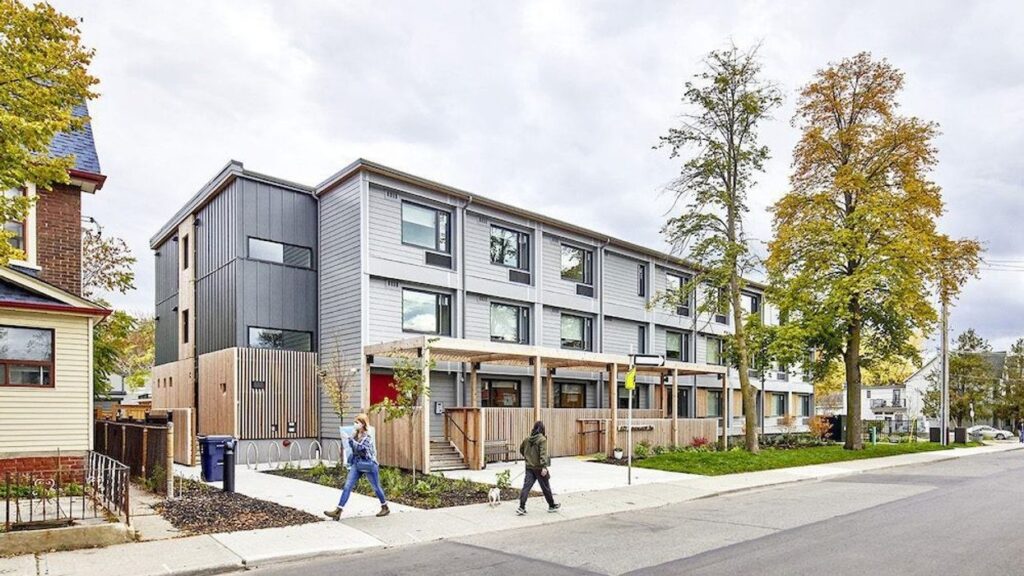
Modular housing as a solution for homelessness: A Path Forward?
The idea of using modular housing as a solution for homelessness offers a promising path forward in addressing one of society’s most pressing challenges. With the growing number of individuals experiencing homelessness, it has become imperative to explore innovative and efficient solutions. In this context, modular housing emerges as a potential game-changer, providing a sustainable and scalable approach to offering shelter and stability.
Modular housing refers to homes that are built in sections, or modules, in a factory setting before being transported to their final location. This method offers numerous benefits, including reduced construction time, cost-effectiveness, and flexibility in design. These advantages make it particularly suitable for addressing the housing needs of homeless populations.

Understanding Modular Housing
To fully appreciate the potential of modular housing as a solution for homelessness, it is essential to understand what modular housing entails. Unlike traditional homes built entirely on-site, modular homes are constructed in a controlled factory environment. This process ensures higher quality control, minimizes waste, and can significantly speed up construction time.
Once the modules are completed, they are transported to the desired location, where they are assembled into a complete home. This method not only reduces the time needed for on-site construction but also lowers labor costs. Additionally, the controlled environment allows for better insulation and energy efficiency, making modular homes more sustainable.
Benefits of Modular Housing for the Homeless
Cost-Effectiveness
One of the primary advantages of modular housing is its cost-effectiveness. Traditional construction methods can be prohibitively expensive, especially when building homes for individuals who are struggling financially. By contrast, modular homes can be built at a fraction of the cost, making them an accessible option for providing affordable housing.
Speedy Construction
The speed of construction is another significant benefit of modular housing. With modules being constructed simultaneously in a factory, the overall building process is much quicker than traditional methods. This rapid construction timeline is crucial when addressing urgent housing needs, such as those faced by homeless populations.
Scalability and Flexibility
Modular housing offers a high degree of scalability and flexibility. Units can be easily added or removed to accommodate changing needs, allowing for the creation of communities that can grow or shrink as necessary. This adaptability is particularly valuable when addressing the dynamic nature of homelessness.
Challenges and Considerations
While modular housing presents numerous advantages, there are also challenges and considerations that must be addressed. One such challenge is the initial investment required to set up a modular housing facility. However, this cost can often be offset by the long-term savings associated with reduced construction times and lower labor costs.
Another consideration is the need for appropriate regulatory frameworks and zoning laws that support the development of modular housing. Ensuring that these structures meet local building codes and standards is essential for their widespread adoption.
Successful Examples of Modular Housing for the Homeless
Throughout the world, there have been successful implementations of modular housing as a solution for homelessness. In Vancouver, Canada, for example, the city has launched several modular housing projects to provide temporary shelter for homeless individuals. These projects have demonstrated the potential of modular housing to quickly and effectively address urgent housing needs.
In the United States, cities like Los Angeles and San Francisco have also explored modular housing as a means of providing affordable and rapid shelter solutions. These initiatives highlight the viability of modular housing as a practical approach to reducing homelessness.
The Future of Modular Housing
The future of modular housing looks promising, especially as more cities and communities recognize its potential to address housing challenges. As technology advances and more efficient building materials are developed, the opportunities for modular housing will continue to expand.
By embracing modular housing as a solution for homelessness, we can take significant steps toward creating a more inclusive society where everyone has access to safe and affordable shelter. For more insights on the future of modular housing, visit The Future of Modular Housing.
Conclusion
In conclusion, modular housing offers a viable and innovative solution for addressing homelessness. Its cost-effectiveness, rapid construction timeline, and adaptability make it a suitable option for providing immediate and long-term housing solutions. While challenges remain, the successful implementation of modular housing projects around the world demonstrates its potential to make a meaningful impact.
As more communities and policymakers embrace modular housing as a solution for homelessness, we move closer to a future where everyone has access to safe and affordable shelter. To learn more about modular homes and their benefits, visit Modular Homes: What You Need to Know.

FAQ
What is modular housing?
Modular housing refers to homes built in sections, or modules, in a factory setting before being transported to their final location. This method offers numerous benefits, including reduced construction time, cost-effectiveness, and flexibility in design.
Why is modular housing a solution for homelessness?
Modular housing is a solution for homelessness because it offers a cost-effective, rapid, and adaptable approach to providing shelter. It allows for the creation of communities that can grow or shrink to meet the needs of homeless populations.
Are there successful examples of modular housing for the homeless?
Yes, there are successful examples of modular housing for the homeless in cities like Vancouver, Los Angeles, and San Francisco, where modular housing projects have been implemented to provide temporary shelter for homeless individuals.
This article contains affiliate links. We may earn a commission at no extra cost to you.